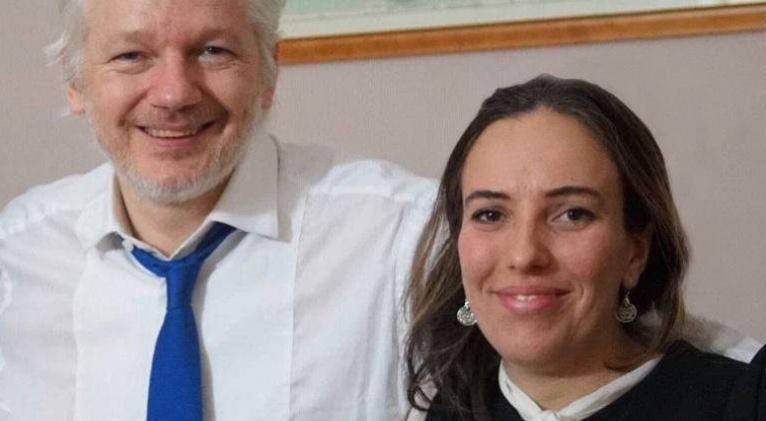Stella Morris, wife of Julian Assange, says his extradition would be end of democracy
especiales

Just a few weeks ago Julian Assange, founder of WikiLeaks, was serving his fourth year in a maximum security prison in the United Kingdom. An extradition order hangs over him to the United States, where the journalist would be tried for 18 crimes related to conspiracy to commit computer intrusion and disclosure of classified documents.
While waiting for the UK Supreme Court to accept or reject the appeal filed by the defense, Assange's family members are finalizing contacts with political leaders and human rights organizations to prevent the extradition.
Stella Moris, lawyer, press freedom activist and Assange's wife, considers her husband's case to be a political persecution and calls on Europe to comply with its human rights standards. Público talks to her on the eve of the premiere of the documentary ITHAKA (Ben Lawrence, 2021), which premiered at the DocsValència festival and explores the most intimate side of the journalist's environment and his struggle to achieve freedom.
-What led you to film the documentary 'ITHAKA'?
-We wanted to show a different side of this story. The documentary is very intimate and raw. It is Assange's story, but also the story of his family, of those of us who are suffering the consequences of the enormous abuse of power being exercised by the states involved. We opened the doors of our lives, of our daily lives and let the camera record when we were interviewed, when we went to the Court, when we talked to Julian, etc.
Assange's case has been very misrepresented politically and legally, and Julian, as a human being, has been completely lost in the story. In fact, he has been greatly discredited with false stories about his character. The documentary also shows the building and progression of the movement for Assange's release from 2019, when we started filming, to 2021. You can see how covid-19 affected our ability to visit him and campaign. Currently the situation is different, the campaign is stronger.
-What is Assange's current situation and what are the next steps?
-In September Assange filed an application to appeal the English High Court's decision to extradite him. I spoke against the decision of Priti Patel, then British Home Secretary, to accept Assange's extradition. We are waiting for the Supreme Court to tell us whether it will hear the appeal. This takes time, it is not automatic.
-What are the chances that Assange will eventually be extradited to the U.S.?
-Legally speaking, it is more likely than not that Assange will never be extradited to the United States. However, this is a political case and politically the situation has improved considerably. We now have support that we didn't have before. For example, the Australian Prime Minister, Anthony Albanese, has said on several occasions that he is seeking a solution with the United States to bring Julian Assange home. In a political case, having the support of your own government is very important. Without that, you have nothing.
On May 3, World Press Freedom Day was celebrated and Assange's case was recurrently named. The White House and the State Department were specifically asked about Assange's case during their daily press briefing. They obviously responded with evasions because their position is untenable.
Also UNESCO had a big meeting on May 2 and Assange's case was mentioned three times. All this means that the case is not going to be forgotten. Quite the contrary, there is more and more awareness and more and more demands for his release.
I have been traveling in recent weeks and have visited Germany and Norway, where I have met with the head of the Human Rights Department of the German Foreign Ministry and the Norwegian Foreign Minister. These countries recognize that this is a political case, so there is some awareness of the issue.
-What other countries and political leaders have officially declared their support for Assange?
In terms of governments, we have been supported by Mexico, Brazil, Argentina, Colombia and some other Latin American countries. Also Australia and China. Claudia Roth, German Minister of State for Culture and Media met with me and said that Assange's release would be good for press freedom, so I count that as German support.
-What response have you had from the Spanish government?
At the institutional level, the Spanish government has not made a statement. I have met with several ministers and I was at an award ceremony in November where Assange received an award. Several ministers were present and I met with them, shook their hands, and so on.
I think there is sympathy and some understanding on a professional level with Assange. But this happens in most countries. When people read and do a little research on the subject, they realize the enormous injustice that is being done to Assange.














Add new comment